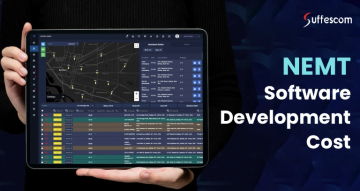How Much Does It Cost to Build a Cryptocurrency Exchange in 2026?

Want to launch your own crypto exchange in 2026? With the DeFi boom, regulatory clarity, and rising investor interest, now’s the time to enter the market. But one question stands tall—how much does it cost to build a crypto exchange platform?
In this guide, we’ll break down the crypto exchange development cost including centralized vs. decentralized models, development options, and region-wise price factors. Whether you're choosing a white-label clone or custom solution, you'll get clarity on every cost driver that matters.
Crypto Exchange Market Growth & Future Potential
The cryptocurrency exchange platform market reached $45 billion in 2022 and is projected to grow to $110.12 billion by 2028, growing at a CAGR of 27.8%. Leading platforms like Binance, Coinbase, Kraken, and eToro dominate the space, but the demand for niche and localized exchanges continues to rise.
If you’re planning to enter this rapidly evolving industry, knowing the costs and strategic approaches is crucial.
Crypto Exchange Development Cost Estimation
The exact cost depends upon the project's complexity and level of customization. Our experts provide a precise quote regarding cost breakdown on crypto exchange platform.
Decentralized crypto exchanges have recently created a buzz in the crypto world. Looking at the perks like avoiding counterparty risks, control over digital assets, ultra-security, no third-party intervention has attracted entrepreneurs to invest in the decentralized exchange development business.
Lets discuss with the experts about the nitty-gritty of the cryptocurrency exchange development cost involving features, manpower, design, etc. Before diving deep, we have enlisted stats related to the crypto exchange market; just go through it.
Get Your Custom Crypto Exchange Cost Estimate Today!
Talk to our experts and receive a detailed breakdown tailored to your project.
Suffescom offers crypto exchange clone scripts like Paxful Clone, Bitfinex Clone, Binance Clone, Coinbase Clone, etc. If you are a novice in the crypto space but want to explore it fully, get connected with our experts at the earliest.
What Determines the Cost of a Crypto Exchange Platform?
Developing a crypto exchange can cost anywhere between $5,000 and $30,000+, depending on the project's scope. Below are the main cost factors:
1. Type of Exchange: Centralized, Decentralized, or Hybrid
Centralized Exchanges (CEX): Easier to build, faster transactions.
Decentralized Exchanges (DEX): Higher security, no third-party control, increased cost.
Hybrid: Combines features of CEX and DEX often the most expensive.
2. UI/UX Design and Development Complexity
A seamless user interface boosts engagement. Costs vary based on dashboard complexity, device compatibility, and animation elements.
3. Security Infrastructure
Security adds to cost but is non-negotiable. Essential features include:
- DDoS Protection
- Multi-Factor Authentication
- Cold Wallet Integration
- End-to-End Encryption
4. Technology Stacks
Selecting the appropriate technology stacks, such as programming languages, databases, and frameworks, is pivotal as it can break or make the functioning of your platform.
The crucial tech building blocks of the crypto exchange are the front end, back end, architecture, design, etc. Starting from the architecture, there is the inclusion of the wallet management system and a robust order-matching engine that makes the platform effective and ultra-secure.
Finally comes the important front and back-end development. The front end involves designing interactive dashboards with unique attributes like graphical charts, admin profiles, etc. On the other hand, the back-end entails setting up the database/server and integrating core characteristics.
| Technological Stacks | Cryptocurrency Development Cost |
| Programming Languages | $5000-$12000 |
| APIs | $4000-$6000 |
| Frameworks | $5000-$8000 |
| Artificial Intelligence | $6000- $15000 |
| Internet Of Things (IoT) | $5000- $20000 |
| Operating System | $9000-$14000 |
| Cloud Storage | $10000-$15000 |
| Database | $6000-$10000 |
Partner with a reliable blockchain app development company to streamline your tech architecture.
5. Token Listing & Liquidity Management
The cost of listing tokens and setting up liquidity pools takes time and development effort. Expect 1–2 weeks of additional work.
Discover Affordable Crypto Exchange Solutions
Explore cost-effective clone scripts or custom-built options with Suffescom.
6. Choosing Development Team
All the above things will work only when a reliable development team will handle the crypto exchange development project. For that, the developers need to be well-versed in blockchain technology.
Moreover, they should be aware of the advanced programming languages and coding techniques to build a highly scalable platform free from all security threats.
Essentially, there are two major classifications of developers on which the crypto exchange development cost depends. Hiring the freelancers and the in-house developers charges will vary drastically. In-house developers adopt agile methodologies, complete the project within the decided time-frame, and charge more. On the other hand, freelancers charge money for the amount of work they have done, i.e., usually on an hourly basis.
7. Geo-Location Of The Developers
It may sound weird, but technically speaking, the developer's location plays a decisive role in the crypto exchange development cost. The already tech-evolved countries will definitely charge more compared to those who have just started their tech journey.
In the table below, we have clearly stated the hourly charges of developers from different regions.
| Geographical Location | Charges Per Hour |
| USA | $70- $90 per hour |
| India | $15-$25 per hour |
| UK | $50-$65 per hour |
| Europe | $55-$80 per hour |
| UAE | $45-$60 per hour |
8. Post-Launch Maintenance and Support
Post-launch costs include monitoring, bug fixes, compliance updates, performance optimization, etc. This is often 10–20% of the development cost annually.
Cost Breakdown: Clone Script vs. Custom Exchange
Clone Script Development
Cost: $5,000 – $10,000
Time to Launch: 1–3 weeks
Examples: Binance Clone, Coinbase Clone, Bitfinex Clone
Custom Development
Cost: $15,000 – $30,000+
Time to Launch: 4–12 weeks
Benefit: 100% tailored to business goals
Suffescom offers high-performing white-label exchange solutions for quick market entry.
Why Choose Suffescom for Affordable Crypto Exchange Development?
Suffescom is the best market leading crypto exchange development company when it comes to developing platforms/applications integrated with contemporary tech stacks and emerging technologies. We offer customized solutions to our clients that help entrepreneurs reach their business goals. Other parameters that make us unique from our competitors are as follows;
- 100% Customization
- Technical Proficiency
- Experienced And Skilled Professionals
- Cost-Effective Prices
- On-Time Project Delivery
- Support And Maintenance Services
- Result Driven Approach
Hurry Up! Time to have a quick consultation with our tech experts.
FAQs
1. How much does it cost to build a crypto exchange?
The cost ranges from $5,000 to $30,000 depending on exchange type, tech stack, security, and development location.
2. Can I build a crypto exchange using a white-label solution?
Yes. Using clone scripts like Binance Clone or Coinbase Clone can reduce costs by 40–60%.
3. What are the key features impacting the development cost?
Wallet integration, liquidity, trading engine, KYC/AML, and admin dashboards.
4. How long does it take to develop a crypto exchange?
Development time ranges from 4 to 12 weeks depending on project complexity.
5. What post-launch services are needed?
Regular maintenance, updates, bug fixes, performance monitoring, and compliance updates.







